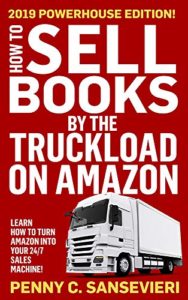 by Penny Sansevieri
by Penny Sansevieri
Raise your hand if you can’t wait until it’s safe to visit bookstores and libraries again! I am so looking forward to browsing the shelves, collecting a pile of treasures, and then finding a quiet corner to examine my new finds before selecting several to take with me to the checkout.
In the spirit of If You Build It, It Will Come, or maybe If You WISH It, It Will Come, I’m going to focus today on the dream many authors have held since they were tiny tots: to have written one of those books customers are holding in the checkout line at a cool/funky/intellectual/[insert your favorite adjective here] independent bookstore.
Obviously every one of us wants to go down in history as a person who wrote a bestseller or even a masterpiece that future generations will gladly read. This seems like a wonderful dream that just comes true when you finish writing your book.
Excuse me while I nudge you gently awake. If you’re an indie author who has self-published your book, the job to market and promote your work falls completely on your shoulders.
The distribution of a self-published book is a specific task, and many authors, especially beginners, have no clue where to start. As an author who went through it myself, I’m happy to share my experience and give you some helpful advice.
Why independent bookstores?
In the publishing world, there’s an old misconception that a self-published book is likely to have poor content and quality; however, interest in authors who publish outside the mainstream has increased over the past few years.
Independent bookstores have become the best supporters of beginning authors and are ready to help them promote their books. And their audiences, people who come to these bookstores specifically in search of non-mainstream literature, are often interested in and open to indie authors.
Market While Still Writing
Many beginning authors wonder “How do I get my book in bookstores?” or “When is the right time to start marketing my book?” The answer is: right now!
The earlier you start, the more you’ll be secure that your book will definitely end up on an independent bookstore’s shelf. What should you do to get a bookstore manager interested? Barbara Steinem, a chief editor at HotEssayService, recommends the following: “Write a good description of your book. Even if your book is currently in the works, or you just have an outline or a small gist, you can already start marketing your book.”
Prepare your marketing plan. Before you contact the bookstore, you should already have an idea of what the marketing campaign of your self-published book will look like. Note this: whatever you want it to be, it should reflect your originality as an author.
Cooperate closely with the bookstore manager. The relationship between a self-publishing author and a bookstore manager should be established as early as possible. The stronger this relationship becomes, the better and more effective your future collaborations will be.
Study the Store’s Demographics
One of the most important steps of preparing the marketing campaign for your self-published book is to study the demographics of an independent bookstore. If you plan to work with multiple stores, you should be aware of who the average customer is in each of them.
What should you take into account when studying the bookstore’s audience? The authors at The Book Professor say it’s the same as defining the audience for your book. Ask yourself the following questions:
- What’s the average age of the bookstore’s audience?
- What’s their gender?
- What geographic area do they live in?
- What are their interests?
For instance, if you’re writing a comic book for children and you live in San Francisco, look for independent bookstores that are frequently visited by kids and teens who are interested in comic books and superhero books, and who are in San Francisco, the Bay Area, and Northern California. You may find that you want to expand your search to all of California or even to surrounding states like Nevada and Oregon.
Give Your Book a Great Cover
When you’re halfway to finishing your book, you can start thinking more seriously about its cover. This may require hiring a professional designer or a photographer to create the best visual calling card for your book.
But what makes a book cover attractive? The Book Designer explains the factors that influence the success of a book cover:
- A good book cover is in tone with the book’s genre.
- A successful book cover gives readers a hint of what the book’s about, in order to generate excitement.
- A creative book cover is always in tone with what the book is about.
So, if you take a look at the traditional book cover of The Great Gatsby, you’ll see the eyes of Dr. T. J. Eckleburg looking over the highway, alluding to the eyes of God. This book cover creates a sense of mystery that only a person who’s read the book can decipher.
A good book cover guarantees that an independent bookstore will accept your book. Moreover, a creative book cover is a prerequisite in the successful marketing campaign of a self-published book.
Ask for Reviews
One more step to get into independent bookstores is getting your book reviewed, which is a cornerstone to your book promotion, no matter what your goals are. A publishing house would find a critic to review a book for marketing purposes, but because you’re publishing it independently, you’ll have to look for someone to review your book.
Here are some legit strategies I have used to get reviews for my books:
- Use your blog. When I had my book ready, I asked the most active readers of my blog to review it. You’ll get the most honest and creative reviews from your loyal followers, who know your works well.
- Ask a bookstore manager for assistance. They often cooperate with many book critics and have a lot of contacts.
- Collaborate with an influencer. To review my book, I worked with an influencer on YouTube who often does book reviews. Influencers often have loyal followers who trust their opinion, so this is a good way of maximizing the number of people who will be interested in buying your book.
Help Them Reach You
 Once your book-promotion campaign launchs, make sure everyone can reach you and check out your activities. Here’s what I’ve done to help everyone interested in my book to reach out to me:
Once your book-promotion campaign launchs, make sure everyone can reach you and check out your activities. Here’s what I’ve done to help everyone interested in my book to reach out to me:
- Create and share a professional email address specifically for the purpose of marketing your self-published book.
- Update your public profile(s) on social media. Make sure you’re active on different social-media platforms, like Facebook and Twitter. You’ll use them for marketing needs as well.
- Make your blog a platform for book promotion. The more platforms you use for marketing, the better.
The independent bookstores you’ll reach out to can do only so much to market your book, so it’s mostly your job to create as many ways as possible to make your marketing campaign successful.
Self-publishing your book and working with independent bookstores as part of your book promotion may seem overwhelming, but keep your eyes on the prize: your book in another person’s hands in a warm and inviting space devoted entirely to the way the written word enriches, enlightens, and entertains us. And if that’s not quite enough to keep you going, picture your favorite independent bookstore, a stack of terrific books (yours among them!), and a reader happily settling in to explore everything your newly self-published title has to offer.
You can do this! Good luck!
Penny Sansevieri, CEO and founder of Author Marketing Experts, Inc. (AME) and an adjunct professor at NYU, is a best-selling author and internationally recognized book marketing and media relations expert. Her company is one of the leaders in the publishing industry and has developed some of the most cutting-edge book marketing campaigns.
